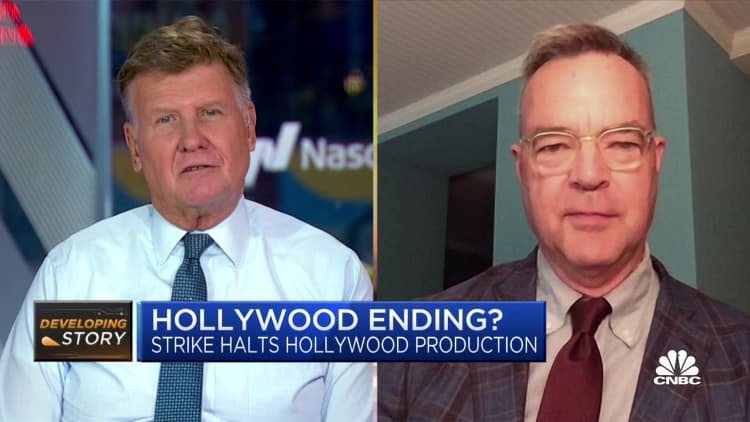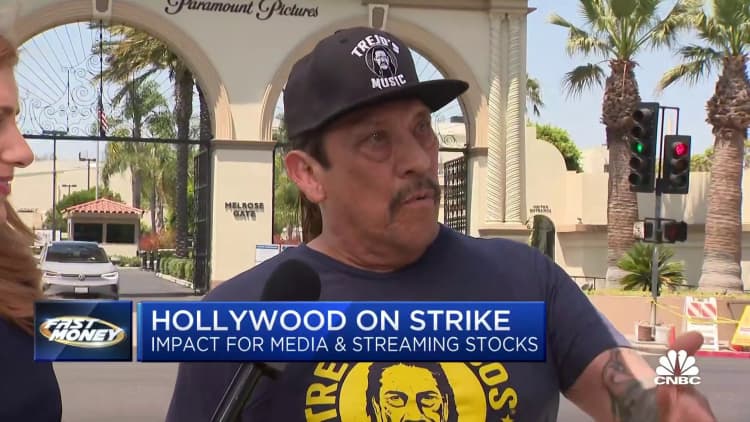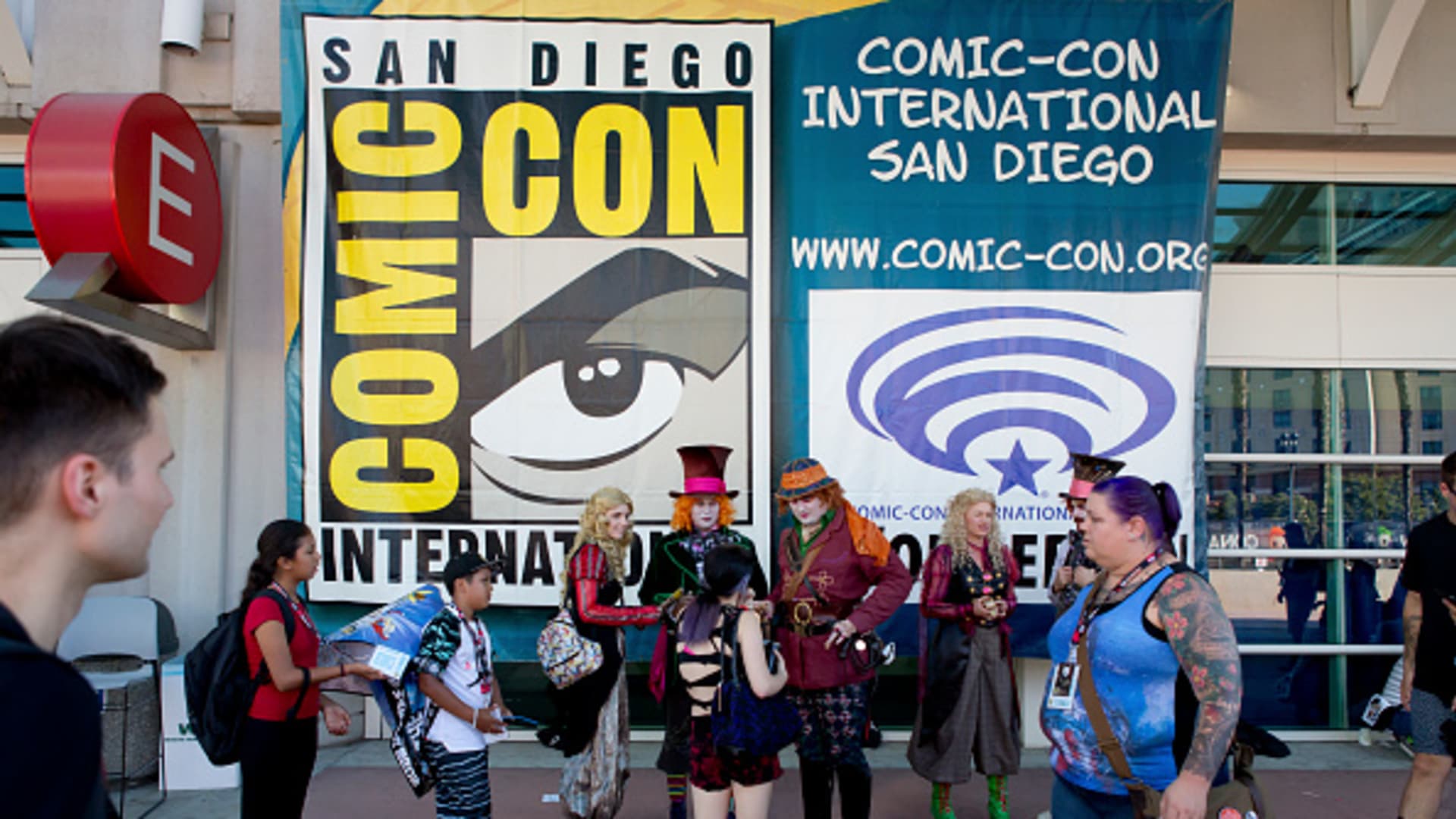Visitors and cosplayers at a poster at San Diego Comic-Con.Ullstein Bild | Ullstein Bild | Getty ImagesSan Diego Comic-Con will return to is roots thi
Visitors and cosplayers at a poster at San Diego Comic-Con.
Ullstein Bild | Ullstein Bild | Getty Images
San Diego Comic-Con will return to is roots this weekend, as Hollywood A-listers skip out on promotional panels and walk picket lines in Los Angeles.
Actors went on strike last Friday, effectively shutting down the film and television industry.
As part of their strike, actors are not permitted to promote any work tied to TV or theatrical contracts with studios. That means no interviews, premieres, social media posts and no conventions.
“The timing of these strikes significantly impacts an important promotional event like Comic-Con,” said Shawn Robbins, chief analyst at BoxOffice.com. “This is often the venue used as a launching pad for marketing machines behind some of the most anticipated fan-driven content coming up in theaters and across the entire media landscape.”
That means no Timothee Chalamet and Zendaya to hype up “Dune: Part Two,” no Quinta Brunson to chat all things “Abbott Elementary” and no Kenan Thompson and Kel Mitchell to preview the long-awaited “Good Burger 2.”
But, even without top talent, SDCC will still kick off Thursday.
“Comic-Con is not going away,” said Robert Thompson, a professor at Syracuse University and a pop culture expert. “The show can still go on in San Diego. Comic-Con is so big that it’s even bigger than the biggest stars.”
Heading into the weekend, many of Hollywood’s studios had already decided to sit out of SDCC’s festivities.
Both Marvel and DC have shared their upcoming slates of comic book films and TV shows, leading both to bow out of marquee Hall H presentations this year. It will be the first time since 2011 that neither franchise studio will have hosted a panel in the coveted, marquee 6,500-seat space.
Now, with actors unable to promote their projects, more than two dozen panels have been canceled. That includes presentations from Amazon’s “Wheel of Time,” Freevee’s “Jury Duty,” ABC’s “Abbott Elementary” and the 25th anniversary panel for “That ’70s Show.”
Typically, actor-focused panels make up between 25% to 30% of a regional comic-con’s programming. At San Diego Comic-Con that percentage can be as high as 40%, industry experts told CNBC.
Representatives for San Diego Comic-Con did not immediately respond to CNBC’s request for comment.
More than Hollywood
Of course, San Diego Comic-Con isn’t just about celebrity talent hawking their newest, nerdiest content. There’s a sprawling floor packed with merchandise from top pop culture retailers like Funko, Entertainment Earth, Hasbro, Gentle Giant and Loot Crate, an artist’s alley packed with artists selling original artwork, autograph stations, and themed on-site activations for popular movies and TV shows. And then there’s the cosplay.
“We’re big movie fans and that’s definitely a part of why we go to cons, to talk to the people involved in productions and hear about what’s coming up,” said Justin Wilder, 36, an assistant director of digital communications in Rhode Island. “It’s been a bit of a bummer to see the reports of different things being canceled.”
Wilder, who is attending his first San Diego Comic-Con this year, is also a panelist at the event for the X-Men Fandom Panel. He told CNBC that while his badge was comped by the convention, he paid out of pocket for his hotel and airfare, which tallied near $3,200 for him and his wife.

He said that even if he wasn’t scheduled on a panel, he would still have made the trip.
“There are plenty of activities that I’m interested in beyond film and TV that will still be happening” he said, noting that the Hellfire Gala, a costumed party based on a popular X-Men comic, was of particular interest.
Many attendees of the upcoming convention told CNBC that they still plan to go regardless of the canceled panels and smaller pool of celebrity appearances. After all, comic creators are still able to attend and promote their work.
San Diego Comic-Con, which launched in 1970, started with just 300 attendees and top comic book and science fiction names like Jack Kirby and Ray Bradbury. Over the decades, it has grown beyond comic books to encompass a larger range of pop culture genres like horror, fantasy, anime, toys and video games, and now exceeds 130,000 attendees annually.
Fewer lines, more crowding
“I used to be able to walk in Hall H in 45 minutes,” said Jason Chau, 46, a sales audit manager from Forest Hills, New York. “The popularity of Marvel, ‘Twilight,’ ‘Game of Thrones’ and ‘Walking Dead’ made the demand on badges crazy.”
Chau has attended SDCC since 2008. He typically spends much of the convention photographing cosplay, attending comic panels and picking up an autograph or two. Chau’s costs to visit San Diego and attend the convention are similar to Wilder’s, but with the added $285 for a four-day badge.
He said that when the convention began to gain more attention from Hollywood, he avoided Hall H presentations, which often require attendees to wait in line over night in order to get a seat. So far, only one Hall H panel has been canceled in the wake of the actor’s strike, with Legendary Entertainment bowing out of the slot.
Still, with more than two dozen panels off the books, SDCC will need to contend with increased foot traffic. Part of the planning process for these types of conventions, is the idea that a certain percentage of attendees will always be standing in line somewhere.
“I’m concerned with all those big panels canceled, how that’s going to affect traffic flow in the exhibit hall,” Wilder said.
Wilder is no stranger to comic conventions, having attended New York Comic Con, Rhode Island Comic Con, Terrificon and Wicked Comic Con.
“For SDCC I’m just trying to keep a positive mindset,” he said.
Those selling merchandise on the show floor are a bit more optimistic about the possibility of larger crowds.
“I think it’s going to be great for fan interaction,” said Ashley Anderson, director of community and social at collectible company Super7. “I mean, you’re going to be able to really emphasize the fan more so than before.”
Pain for studios
The lack of celebrities is more likely to hit the studios themselves. After all, the publicity of having stars boycott promotional activities reflects directly back at Hollywood’s producers, who have already been lambasted in the press for purportedly underhanded tactics.
“Not having some of pop culture’s biggest names at Comic-Con or elsewhere to support their latest projects is a loss for the convention and for fandom in the short term,” Robbins said. “In the bigger picture, it highlights the industry’s fight for low-and-middle class wage earners.”
Several SDCC attendees told CNBC that they are disappointed that some panels have been canceled and some celebrities will not be attending the event, but understand why it is happening.
“It’s unfortunate timing, but what they’re asking for makes a lot of sense,” said Wilder of the strike. “AI technology has the potential to transform a lot about the film and TV industry and people are concerned with their job security. I don’t want people to blame the actors or writers for the con being different, they’re just trying to make sure they get a fair deal for their work and aren’t being taken advantage of.”

Coupled with potentially bad publicity, studios are also losing out on some major promotional opportunities at the convention. Sure, the companies can still play trailers, hang up billboards and sponsor interactive fan activations, but a lot of the viral social media moments come from having actors on scene doing interviews and publicly hyping up shows and films while interreacting with fans and each other.
“Comic-Con [is] one great big promotional infomercial for the big studios and the streamers,” said Thompson. “
And studios need this marketing, especially after a softer-than-expected summer movie season.
“We’ve already seen several adult-aimed blockbusters underperform this summer during a time when, perhaps not coincidentally, some outlets such as talk shows weren’t airing or hosting guests to promote movies like ‘Mission: Impossible,’ ‘Indiana Jones,’ and ‘The Flash,'” said Robbins.
Upcoming potential blockbusters like Warner Bros.’ “Barbie” and Universal’s “Oppenheimer” had strong marketing campaigns ahead of the strike, and likely won’t feel pain from the actors strike, but others might not be so lucky.
“Studios and theaters are relying on a great deal of content to deliver strong box office results in the coming months and next year,” Robbins said. “Both will endure a period of revenue regression amid the broader post-pandemic recovery if these labor conflicts aren’t resolved soon, likely causing a domino effect of release delays and rushed or unfinished productions. Those are consequences theater owners really have no control over. Unlike Covid, however, Hollywood executives do.”
Disclosure: Comcast is the parent company of NBCUniversal and CNBC. NBCUniversal is a member of the Alliance of Motion Picture and Television Producers.
www.cnbc.com
